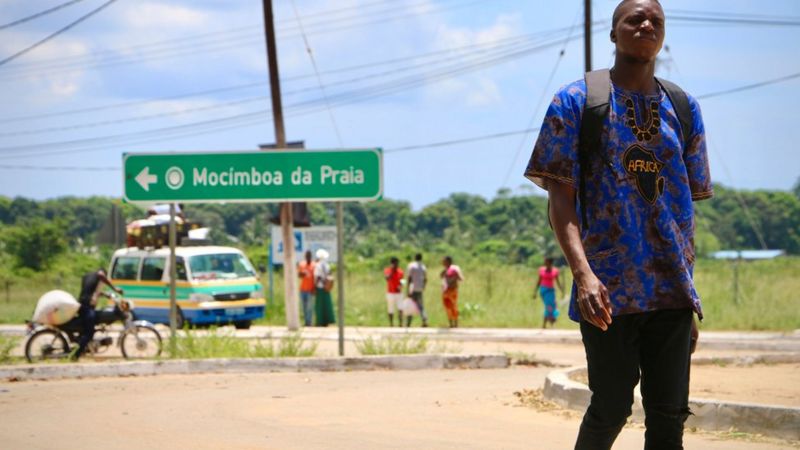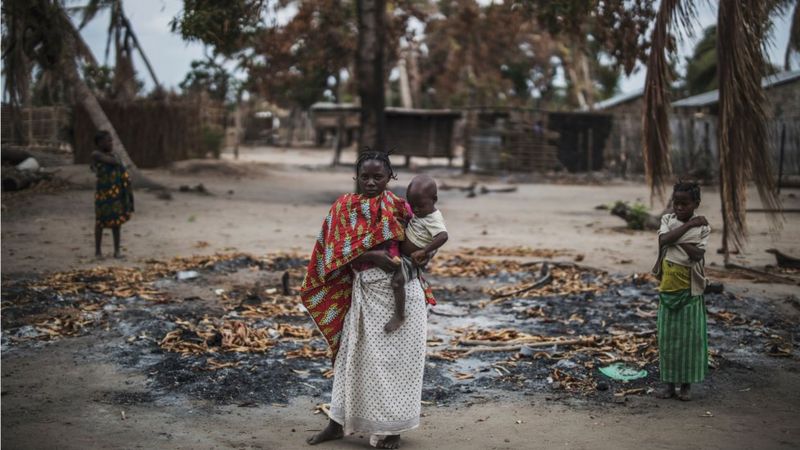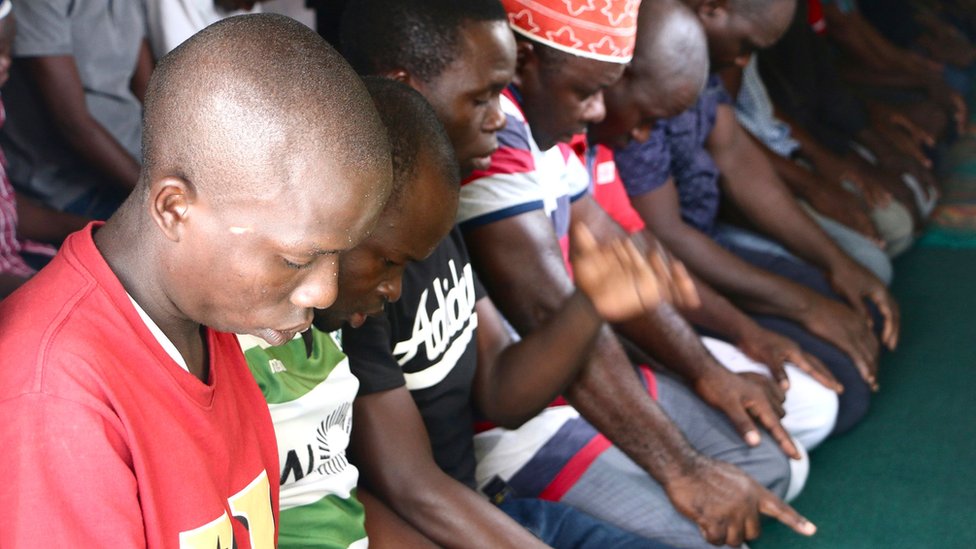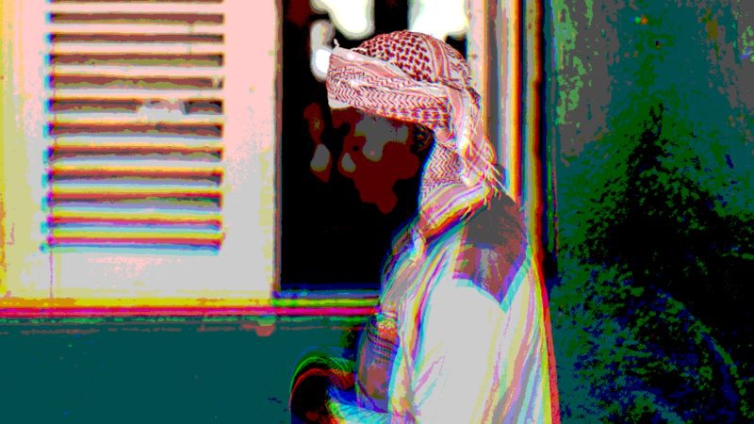Mozambican troops are failing to recapture a port town from Islamist militants which is important for developing one of the largest natural gas reserves in Africa, as the country - three years into an Islamist insurgency - becomes yet another "resource-curse" state, writes Mozambique analyst Joseph Hanlon.
President Filipe Nyusi is finally facing the reality of the "resource curse".
Insurgents are recruiting more members by exploiting the poverty of young people in the north of Mozambique, he explained in a recent speech in Pemba, the capital of Cabo Delgado province.
He admitted that despite the three northern provinces - Cabo Delgado, Niassa, and Nampula - having great natural wealth and enormous agricultural potential, they have the country's highest levels of poverty.

For 15 years, Mozambique's GDP rose by more than 6% a year, largely thanks to coal, titanium, hydro-electricity and other natural resources. Yet the majority of people did not benefit; poverty and inequality both increased.
Discoveries of a huge ruby deposit and a giant gas field in Cabo Delgado in 2009-10, raised hopes of jobs and a better life for many local people, but those hopes were soon dashed.
It was alleged that any benefits were being taken by a small elite in the Frelimo party, which has governed Mozambique since independence in 1975.
Roots of the Islamist uprising
A war started on 5 October 2017 when a group of insurgents occupied the district town and port of Mocimboa da Praia for two days. The town is just 60km (about 32 miles) south of the major gas development base at Palma and the port was important to supply the gas project.
The insurgents were recognised as local men. Since then the war expanded rapidly; at least 1,500 people have been killed and an estimated 250,000 have fled their homes.

The government has lost control of three coastal districts.
Insurgents have occupied Mocimboa da Praia twice more, and after the 12 August occupation they stayed; despite heavy fighting government forces have not dislodged them.
In the past three decades Cabo Delgado has seen an influx of Christian and Muslim fundamentalists and of religious international aid agencies trying to convert local people.

Cabo Delgado is majority Muslim and the new Islamist preachers, both East Africans and Mozambicans trained abroad, established mosques and argued that local imams were allied to Frelimo and its grabbing of the wealth.
Some of these new mosques provided money to help local people start business and create jobs - and the Islamists argued the society would be fairer under Sharia.As President Nyusi now admits, this proved attractive.
Repeating the anti-colonial battle
There were violent confrontations in 2015 when police and traditional Muslim leaders tried to block the fundamentalists, who then moved to train militias, which launched the first attack on Mocimboa da Praia.
Initially the insurgents received training in Mozambique from former Mozambican police and soldiers. Then the internal war drew outside support.
The government has hired foreign mercenaries, while the insurgents are receiving training - in both military and religious studies in East Africa - from jihadists from abroad and have made informal links with the Islamic State group.
It is ironic that Frelimo's independence war began on 25 September 1964 in Chai, just 60km west of Mocimboa da Praia.
Frelimo recruited young fighters with a very similar rhetoric - the Portuguese colonial authorities were taking all the wealth and independence would be more equitable.
Two leaders of the independence war, Alberto Chipande and Raimundo Pachinuapa, are both now 81 years old and are the most powerful men in Cabo Delgado. They are also both members of the Frelimo Political Commission, the party's key decision-making body. But they face an insurgency which labels them in the same way they labelled the colonisers 55 years ago.
The origins of the new war go back a decade.
In 2009 one of the largest ruby deposits in the world was discovered in Montepuez and initially artisanal miners and local farmers and traders benefitted.
But the concession was awarded to Mr Pachinuapa in partnership with a major mining company. Thousands of small miners and farmers in the huge concession area were affected.
Last year, Gemfields agreed to pay £5.8m ($7.5m) to settle a London court case brought by 273 people alleging human rights abuses in the clearing of the land. Its subsidiary, which says it has complied with Mozambican resettlement laws, announced in August that 105 residential houses had been completed for a village that is being relocated.
Then in 2010 one of the largest natural gas fields in Africa was discovered off the coast of Cabo Delgado. Again members of the elite profited by servicing the gas companies, while local people lost out. Environmental campaign groups like Justica Ambiental say the compensation offered has been inadequate.
Local farmers who grow food with no tools other than a hoe lost their land; fishers with tiny boats or only nets on the beach were pushed out.
Young people with some education who hoped for a life better than their illiterate parents lost those hopes.
From communists to oligarchs
But the roots of this approach go back much further.
At independence Mozambique tried to follow a socialist path which antagonised the West and led to a 1982-92 proxy war in which one million people died.
With the end of the Cold War in 1992, the West imposed on Mozambique the kind of shock therapy used in eastern Europe, to rapidly convert the communists to capitalists.
But this was a capitalism built on access to state resources - businesses, contracts, land, commissions, which created oligarchs rather than businesspeople.
There was a forced privatisation of hundreds of state companies, preferentially to military and Frelimo party leaders.
The World Bank later admitted it gave loans that it knew could not be repaid to those privatised companies.
In the early 2000s two anti-corruption campaigners who were exposing the looting of privatised banks were murdered.
Shortly afterwards, Mozambique received $122m (£94m) more than it asked for at a donor conference.
Jobs - but not for Mozambicans
In 2013-14 top officials arranged a hugely corrupt $2bn loan - about 20 people in Mozambique have been indicted over what is now known as the "secret loan" scandal.At first donors balked. But as the size of the gas discovery became clear, donors dropped talk of good governance and poverty reduction, and instead stressed openness to foreign investment.

There was no more than a pro-forma objection from the international community when Frelimo was accused of widespread rigging during the 2019 election.On 17 July 2020 a $14.9bn loan agreement was signed to fund the gas project:
- UK Export Finance will guarantee $1bn, which it proudly says will support 2,000 jobs in the UK
- The US Export-Import Bank approved a $4.7bn loan, which will support 16,700 US jobs.
The construction project itself will employ only 2,500 Mozambicans. So more than seven times as many jobs are being created in the US and UK as in Mozambique.
Most of the Mozambican jobs will not be filled by people from Cabo Delgado.
Thus this will not end the feeling of marginalisation and hopelessness of many young men in Cabo Delgado, who will continue to join the insurgents.
The result is a failing, resource-curse state with increasing poverty and inequality, but with profits and jobs for foreign companies and money for key people in government and in Frelimo.
Mozambique is still looking for a military solution. It already has South African mercenaries flying helicopters, and it is talking to South Africa, France, the US and other countries about possible military support - including naval patrols.
But that does not solve the problem of impoverished young men with no hope.
Without redressing the grievance and creating many jobs, the war will continue - and so will the profits.
Latest Stories
-
Shamima Muslim urges youth to lead Ghana’s renewal at 18Plus4NDC anniversary
24 minutes -
Akufo-Addo condemns post-election violence, blames NDC
31 minutes -
DAMC, Free Food Company, to distribute 10,000 packs of food to street kids
2 hours -
Kwame Boafo Akuffo: Court ruling on re-collation flawed
2 hours -
Samuel Yaw Adusei: The strategist behind NDC’s electoral security in Ashanti region
2 hours -
I’m confident posterity will judge my performance well – Akufo-Addo
2 hours -
Syria’s minorities seek security as country charts new future
3 hours -
Prof. Nana Aba Appiah Amfo re-appointed as Vice-Chancellor of the University of Ghana
3 hours -
German police probe market attack security and warnings
3 hours -
Grief and anger in Magdeburg after Christmas market attack
3 hours -
Baltasar Coin becomes first Ghanaian meme coin to hit DEX Screener at $100K market cap
4 hours -
EC blames re-collation of disputed results on widespread lawlessness by party supporters
4 hours -
Top 20 Ghanaian songs released in 2024
5 hours -
Beating Messi’s Inter Miami to MLS Cup feels amazing – Joseph Paintsil
5 hours -
NDC administration will reverse all ‘last-minute’ gov’t employee promotions – Asiedu Nketiah
5 hours

